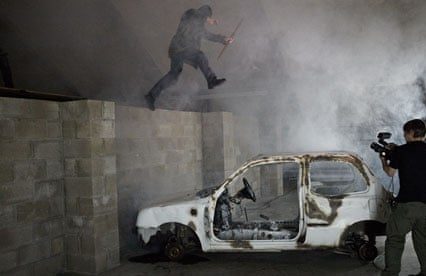Coriolan/us: Dylan Moore casts a critical eye over National Theatre Wales‘ latest site-specific theatrical experience in his review of Coriolan/us.
National Theatre Wales like the word ‘us’. It was there in Michael Sheen’s Passion of Port Talbot – its film adaptation was called The Gospel of Us – and it is here, prominently, in the multi-layered title of Mike Pearson and Mike Brookes’ latest site-specific offering. The team that brought Aeschylus’ The Persians to the Brecon Beacons military range have now commandeered a disused aircraft hangar a few miles outside Cardiff to stage an experimental version of Shakespeare’s Coriolanus, sprinkled with Bertolt Brecht’s unfinished version Coriolan. The German’s curtailed title allows the production to work on – at least – three levels.
First, there is Coriolanus, the tragedy A.C. Bradley said had been ‘built on the grand scale’, set in Rome during turbulent times. Next there is the Brechtian adaptation, an anti-fascist propaganda piece where claims that ‘soaring prices come from the gods, not from man’ simply won’t wash with the plebeians. And then there is the spin that Pearson and Brookes have chosen to put on NTW’s contribution to the London 2012 Festival.
Coriolan/us is a multimedia production. The audience wear headsets throughout and the play is projected – black and white and in real time – on two gigantic screens suspended from the concrete arc of the ceiling. The play is rooted in our own era of 24-hour rolling news coverage. The revolution is not only televised but also tweeted and recorded on cameraphones.
There is an excitement to the production’s use of vehicles, a breezeblock corridor that becomes a warzone – filled with dry ice, explosions and burnt-out cars – and stripped out caravans where actors are never quite offstage. But there is also an unsettling minimalist aesthetic at work, perhaps surprising given the scale of the venue. The fact that despite all the boundary-pushing of site-specific theatre we are ultimately in a cold, characterless and empty space is not only an employment of Brecht’s alienation effect but also allows us to focus on the language.
As we would expect from Shakespeare, there are some magnificent turns of phrase, most of which are reserved for contempt toward ‘the lowest, basest, poorest of all the rabble.’ When the prospect is raised of the plebs having a say in governance, they are described as ‘crows to peck at eagles’. By modern standards, we might wish such class hatred a thing of the past. If only.
Likewise Caius Martius, the hero who becomes Coriolanus, is judged and honoured by the number of his war wounds. ‘Every gash was an enemy’s grave’ becomes a prelude to the creation of a monster as events conspire to set Rome’s hero against his own as internecine strife rips the city apart. Essentially a fighting machine, Coriolanus refuses to be drawn into political machinations.
The production’s emphasis on public space and mediation of sound and image helps tease out the threads of a play that has at its heart the hero’s lack of opportunity for thought. Like in the contemporary politico-martial sphere, events cannot be controlled, much as politicians will try. Coriolanus is almost unique among Shakespeare’s tragic heroes for his dearth of soliloquising – he is alone onstage just twice – and although we scarcely pity him, we empathise with the lack of opportunity his world has given him to reflect on his actions.
In a piece full of technical surprises, it is perhaps the role of women that provides the biggest shock, a counterpoint to the unrelenting violence of the language. Near the end, a messenger says ‘Good news, the ladies have prevailed’ and the turning point comes when Coriolanus’ mother delivers an impassioned plea for her son to change his course. ‘O mother, mother, what have you done?’ comes the reply. ‘The gods look down and this unnatural scene they laugh at.’
Earlier, the warrior delivers a line that – like Pearson and Brookes’ previous NTW triumph, Aeschylus’ The Persians – gets close to the true nature of war. Looking at his wife, who has been waiting Penelope-like for his return, Coriolanus says ‘Such eyes the widows in Corioli wear, And mothers that lack sons’. Suffering is suffering whether it is visited on others or coming home to roost. As the Romans find when they banish their wayward hero to exile with the accusation that he’s ‘a disease that must be cut away… he’s but a limb’ the gangrene has set in to them all.
The fact that this particular play and its brutal, complex lessons was chosen as NTW’s contribution to the London 2012 Festival tells us much about the urgency with which the problems of today’s world might be addressed, although there are no easy answers. On a night when Wales’ Jade Jones was winning Olympic gold in Tae-kwon-do, the feelgood factor failed to permeate Hangar 858. Darkly one might conclude that Coriolan/us will resonate ever more strongly once the flags come down and the ‘real’ news agenda returns.
For more Wales Arts Review coverage of National Theatre Wales, including news, reviews, and interviews, click here.












